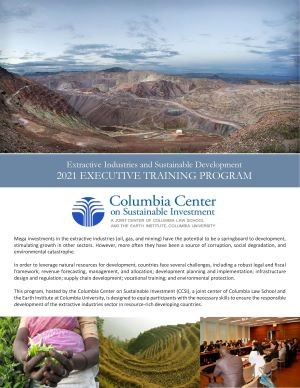Download the 2021 Executive Training Brochure here.
Mega investments in the extractive industries – including oil, gas, and mining – have the potential to be a springboard for development in many low- and middle-income countries, through major tax revenues, technology transfer, infrastructure development, employment and capacity building. However, reaping those benefits is challenging, and more often these investments have been a source of corruption, social degradation, resource dependency, and environmental catastrophe. How then can resource-rich countries faced with this double-edged sword make informed decisions about how to effectively leverage these resources for economic and social development while mitigating negative externalities?
In order to leverage natural resources for development, countries face a number of challenges related to the development and enforcement of a robust legal and fiscal framework; revenue forecasting, management, and allocation; development planning and implementation; infrastructure design and regulation; supply chain development; vocational training; and environmental protection; among others.
The Columbia Center on Sustainable Investment (CCSI) tackles this complex challenge with policy-makers and practitioners in an annual Executive Training on Extractive Industries and Sustainable Development, held each June at Columbia University in New York City. The 2021 training took place online June 7-18, 2021.
The program is designed to equip participants with the necessary skills to promote the responsible development of the extractive industries sector in resource-rich developing countries and to encourage a rich dialogue about best practices from around the globe. The two-week training emphasizes the interdisciplinary nature of resource-based development. By working through real case studies and with practitioners and experts in the field, participants will be able to apply analytical tools and frameworks to the unique context of the extractive industries in their country.
Who should attend?
The program is designed for mid-level public sector officials and civil society representatives from resource-rich developing countries, whose responsibilities relate to the development or management of the extractive industries sector. A select number of representatives from the private sector and development agencies may also be admitted.
Selected Faculty
The course draws on faculty from Columbia University as well as other experts from around the world, teaching on specific topics related to their expertise. Past faculty has included:
- Jeffrey D. Sachs, Director, Center for Sustainable Development, Columbia University, and Special Advisor to United Nations Secretary-General António Guterres
- Rachel Davis, Managing Director, Shift; Research Fellow, Corporate Social Responsibility Initiative, Harvard Kennedy School
- Tom Mitro, Co-Director, Graduate Certificate in Global Energy, Development and Sustainability, University of Houston
- Daniel Franks, Programme Manager and Chief Technical Advisor, ACP-EU Development Minerals Programme, United Nations Development Programme
- Amir Shafaie, Legal and Economics Program Director, Natural Resource Governance Institute
- Antonio Pedro, Director, Sub-regional Office for Central Africa, United Nations Economic Commission for Africa
- Lisa Sachs, Director, Columbia Center on Sustainable Investment
- Senior economics, legal and technical staff of CCSI
If you have any questions about the program or if you would be interested in sponsoring participants in the program, please contact us at [email protected].

